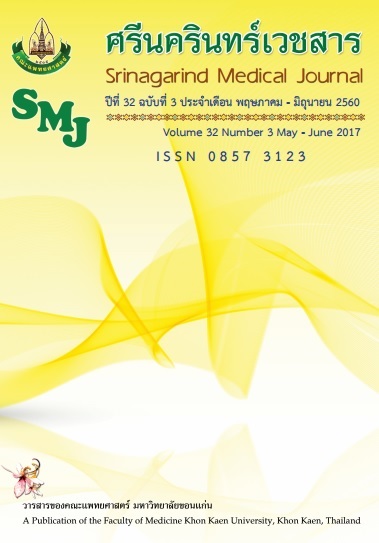Operating Room Nurses’ Confidence for Cardiac Arrest Care in the Operating Room
Keywords:
cardiac arrest, confidence, operating room nurses, resuscitation, การช่วยชีวิตความมั่นใจพยาบาลห้องผ่าตัดภาวะหัวใจหยุดเต้นAbstract
Background and objective: Operating room nurse was one of the team's personnel who is crucial to the success of resuscitation. Cardiac arrest management requires an effective resuscitation team. Our study aimed to investigate the operating room nurse’s confidence for cardiac arrest management. We also studied the associated factors influencing on their confidence.
Materials and methods: This study was a prospective description study in 113 operating room nurses who work at Srinagarind hospital, faculty of Medicine, Khon Kaen university. We assessed their confidence level during cardiac arrest management and associated factors
Results: The response rate was 65.5 %.Fair to strongly confidence in willing to perform was 62.8%, basic life support was 62.2%, advanced life support was 60.8%. 50% of operating room nurses did not have confidence in opening airway, ventilation, and automatic defibrillation. Associated factors were life support training, and resuscitation protocol.
Conclusion: One third of operating room nurses did not have confidence in willing to performing, basic life support, advancedlife support and resuscitation skill. And periodic training and efficiency resuscitation protocol were associated with their confidence.
ความมั่นใจของพยาบาลห้องผ่าตัดในการดูแลผู้ป่วยที่มีภาวะหัวใจหยุดเต้นในห้องผ่าตัด
หลักการและวัตถุประสงค์:พยาบาลห้องผ่าตัดเป็นบุคลากรที่มีบทบาทสำคัญห้องผ่าตัด ซึ่งการดูแลผู้ป่วยที่มีภาวะหัวใจหยุดเต้นต้องอาศัยความร่วมมือของบุคลากรในห้องผ่าตัดในการดูแลผู้ป่วย ดังนั้นจึงต้องการศึกษาความมั่นใจของพยาบาลห้องผ่าตัดในการช่วยชีวิตผู้ป่วยรวมทั้งปัจจัยที่เกี่ยวข้อง
วิธีการศึกษา:การศึกษาเชิงพรรณนาแบบไปข้างหน้าในพยาบาลวิชาชีพที่ปฏิบัติงานที่ห้องผ่าตัด โรงพยาบาลศรีนครินทร์ คณะแพทยศาสตร์ มหาวิทยาลัยขอนแก่น จำนวน 113 คน โดยใช้แบบประเมินความมั่นใจในการดูแลผู้ป่วยขณะที่มีภาวะหัวใจหยุดเต้น รวมทั้งบันทึกปัจจัยต่าง ๆ ที่อาจเกี่ยวข้องกับความมั่นใจในการดูแลผู้ป่วย
ผลการศึกษา:อัตราการตอบแบบประเมินร้อยละ 65.5โดยพบว่าความมั่นใจในระดับปานกลางถึงมากในความพร้อมที่จะเข้าช่วยเหลือร้อยละ 62.8 การช่วยชีวิตขั้นพื้นฐานร้อยละ 62.2 การช่วยชีวิตขั้นสูงร้อยละ60.8 โดยทักษะที่ไม่มั่นใจคือ การเปิดทางเดินหายใจ การช่วยหายใจ การใช้เครื่องช็อกหัวใจด้วยไฟฟ้า และปัจจัยที่เกี่ยวข้องคือการอบรมการช่วยชีวิตและการเข้าใจระบบงานในการช่วยชีวิต ( p < 0.05 )
สรุป:พยาบาลห้องผ่าตัดหนึ่งในสามไม่มีความมั่นใจในการดูแลผู้ป่วยที่มีภาวะหัวใจหยุดเต้นในด้านการเข้าช่วยเหลือผู้ป่วย การช่วยชีวิตขั้นพื้นฐานและขั้นสูง และมีหลายทักษะที่ไม่มั่นใจ ดังนั้นการอบรมการช่วยชีวิตอย่างสม่ำเสมอและการมีระบบการช่วยชีวิตที่ดีเป็นปัจจัยสำคัญที่เกี่ยวข้องกับความมั่นใจ




